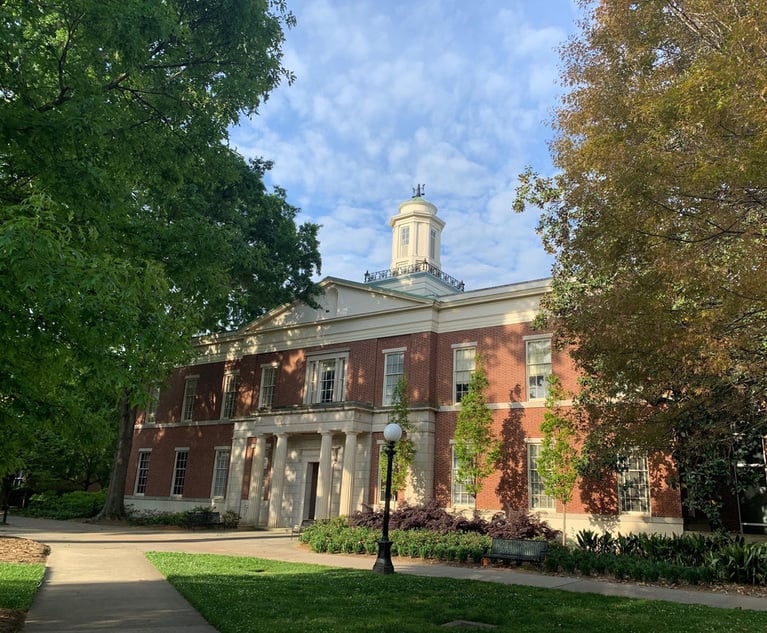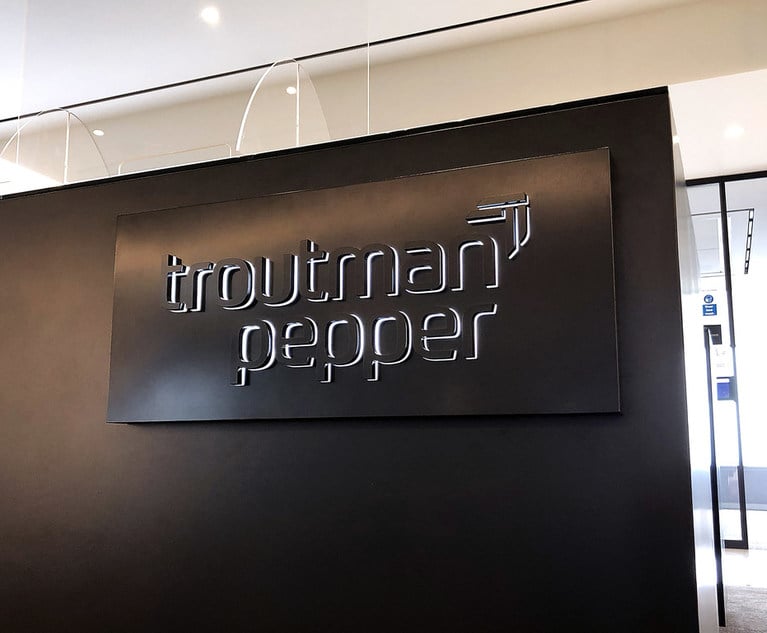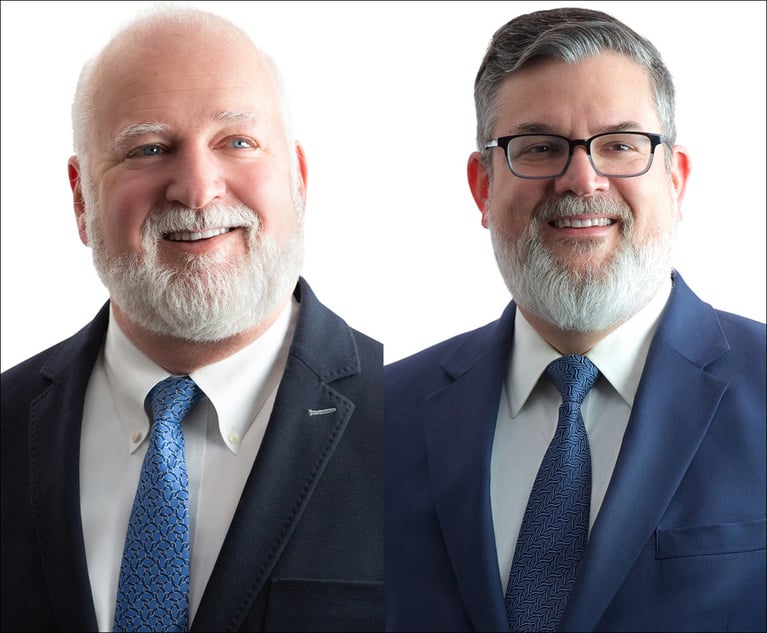Judge OKs $77.5M in Legal Fees, Approves Equifax Data Breach Settlement
"I don't think anyone can credibly argue it doesn't provide substantial relief for the class now and in the future," U.S. District Chief Judge Thomas Thrash Jr. said of the settlement.
December 19, 2019 at 03:34 PM
6 minute read
 Kenneth Canfield of Doffermyre Shields Canfield & Knowles, Atlanta, enters the Richard B. Russell Federal Courthouse in Atlanta. (Photo: John Disney/ALM)
Kenneth Canfield of Doffermyre Shields Canfield & Knowles, Atlanta, enters the Richard B. Russell Federal Courthouse in Atlanta. (Photo: John Disney/ALM)
The chief judge of the Northern District of Georgia on Thursday gave final approval to a $1.4 billion settlement agreement between Equifax and a class of 147 million consumers whose financial and personal data was exposed.
U.S. District Chief Judge Thomas Thrash Jr. also approved $77.5 million in legal fees and more than $1.4 million in expenses sought by the plaintiff consumers' class counsel for their role in negotiating what Thrash called "a historically significant data breach settlement."
"I don't think anyone can credibly argue it doesn't provide substantial relief for the class now and in the future," Thrash said at the end of a four-hour final approval hearing Thursday.
In granting class counsel's fee request in full, Thrash said attorneys put in more than 33,000 hours, defeated Equifax's motion to dismiss more than 400 claims that formed the basis of the multidistrict litigation and engaged in a "complex and highly adversarial" mediation. "In my opinion, plaintiffs' counsel took a serious risk in this litigation that could have terminated in Equifax's favor," he said.
The judge said the fee award is about 20% of $380 million set aside to provide consumers with extended credit monitoring, identity protection and repair services or reimburse them for expenses if their identities were stolen.
Thrash said attorney fee awards in data breach cases involving The Home Depot, Arby's, Target, and Anthem ranged from 27%-30%.
The judge also rejected arguments that substantial nonmonetary benefits included in the settlement couldn't be considered in calculating the fee award. "I think the result that has been achieved in this case has been exceptional and warrants approving the award," he said.
In approving the settlement, Thrash said that consumer anger about the Equifax data breach was unprecedented. "I've never seen anything like it in any other consumer data breach case I have handled," he said. "Nobody chooses to give information to Equifax. Equifax gets information from banks, merchants, landlords and employers. Then Equifax makes money selling that information back to banks, merchants and employers."
Thrash first issued his preliminary approval of the deal July 22. More than 400 cases filed across the nation following Equifax's September 2017 announcement of the unprecedented breach were consolidated in multidistrict litigation in the Northern District of Georgia in Atlanta.
Counsel for Equifax and for the class of 147 million consumers all have called the proposed settlement "unprecedented" in its scope and acknowledged in court papers that it was reached only after a series of contentious and difficult settlement negotiations.
The global settlement also resolves separate claims and enforcement actions by the U.S. Federal Trade Commission, the Consumer Financial Protection Bureau and a multistate group of attorneys general from 48 of the nation's 50 states, the District of Columbia and Puerto Rico.
Equifax is represented by a team of King & Spalding lawyers led by partners David Balser and Phyllis Sumner.
In asking Thrash to approve the settlement, Balser said the proposed settlement agreement "reflects the maximum Equifax is willing to do to resolve these claims."
The consumer class counsel team includes Kenneth Canfield of Atlanta's Doffermyre Shields Canfield & Knowles; Norman Siegel of Stueve Siegel Hanson in Kansas City, Missouri; and Amy Keller of Dicello Levitt Gutzler in Chicago.
Canfield said the consumer response to the settlement notice has been "overwhelmingly positive" and "unusually high." He said there have been more than 130 million visits to the class website, and 15 million people have already filed claims to date. "I am unaware of any class action that has had this type of response," he said.
Thrash approved the deal despite an objection filed by Ted Frank, director of the Center for Class Action Fairness at the Hamilton Lincoln Law Institute in Washington, D.C. Frank targeted what he called an "excessive" legal fee request, suggesting it should be slashed to $16 million. Frank also argued the true value of the proposed settlement was $162 million.
In court papers, Equifax attorneys said nearly 65% of the total objections filed were submitted via a chatbot run by a third party claims filing service called Class Action.
Two state attorneys general—Massachusetts' Maura Healey and Indiana's Curtis Hill Jr.—also filed amicus briefs supporting objectors, calling on Thrash to reject the settlement unless it's modified to ensure that their separate state enforcement actions against Equifax won't be invalidated by the deal.
Thrash said their objections were invalid because the two states aren't class members and therefore have no standing to object.
Thrash said nothing in the settlement that prevents the Massachusetts and Indiana AGs from pursuing state claims or consumer enforcement actions in their respective state courts.
Under the terms of the consumer settlement, Equifax will pay $380.5 million earmarked for class benefits, fees, expenses and service awards, as well as notice and administration costs. Those benefits include up to 10 years of free credit monitoring or a one-time cash payment of up to $125 subject to a $31 million total cap and reimbursement of up to $20,000 for out-of-pocket losses fairly traceable to the data security breach.
Equifax also will pay up to an additional $125 million, if needed, to satisfy claims for consumers' out-of-pocket losses from efforts to defend against identity theft and $1 billion spent over five years to upgrade the company's data security and related technology.
Because there is no cap on the settlement, Equifax could pay as much as $2 billion more, if all 147.4 million class members sign up for 10 years of free credit monitoring, the class lawyers said. No settlement funds will revert to Equifax.
This content has been archived. It is available through our partners, LexisNexis® and Bloomberg Law.
To view this content, please continue to their sites.
Not a Lexis Subscriber?
Subscribe Now
Not a Bloomberg Law Subscriber?
Subscribe Now
NOT FOR REPRINT
© 2025 ALM Global, LLC, All Rights Reserved. Request academic re-use from www.copyright.com. All other uses, submit a request to [email protected]. For more information visit Asset & Logo Licensing.
You Might Like
View All
28 Firms Supporting Retired Barnes & Thornburg Litigator in Georgia Supreme Court Malpractice Case
7 minute read
Troutman Pepper Says Ex-Associate Who Alleged Racial Discrimination Lost Job Because of Failure to Improve
6 minute read

Law Firms Expand Scope of Immigration Expertise Amid Blitz of Trump Orders
6 minute readLaw Firms Mentioned
Trending Stories
- 1Trump Taps McKinsey CLO Pierre Gentin for Commerce Department GC
- 2Critical Mass With Law.com's Amanda Bronstad: 700+ Residents Near Ohio Derailment File New Suit, Is the FAA to Blame For Last Month's Air Disasters?
- 3Law Journal Column on Marital Residence Sales in Pending Divorces Puts 'Misplaced' Reliance on Two Cases
- 4A Message to the Community: Meeting the Moment in 2025
- 5Ex-Prosecutor Denies on Witness Stand That She Tried to Protect Ahmaud Arbery's Killers
Who Got The Work
J. Brugh Lower of Gibbons has entered an appearance for industrial equipment supplier Devco Corporation in a pending trademark infringement lawsuit. The suit, accusing the defendant of selling knock-off Graco products, was filed Dec. 18 in New Jersey District Court by Rivkin Radler on behalf of Graco Inc. and Graco Minnesota. The case, assigned to U.S. District Judge Zahid N. Quraishi, is 3:24-cv-11294, Graco Inc. et al v. Devco Corporation.
Who Got The Work
Rebecca Maller-Stein and Kent A. Yalowitz of Arnold & Porter Kaye Scholer have entered their appearances for Hanaco Venture Capital and its executives, Lior Prosor and David Frankel, in a pending securities lawsuit. The action, filed on Dec. 24 in New York Southern District Court by Zell, Aron & Co. on behalf of Goldeneye Advisors, accuses the defendants of negligently and fraudulently managing the plaintiff's $1 million investment. The case, assigned to U.S. District Judge Vernon S. Broderick, is 1:24-cv-09918, Goldeneye Advisors, LLC v. Hanaco Venture Capital, Ltd. et al.
Who Got The Work
Attorneys from A&O Shearman has stepped in as defense counsel for Toronto-Dominion Bank and other defendants in a pending securities class action. The suit, filed Dec. 11 in New York Southern District Court by Bleichmar Fonti & Auld, accuses the defendants of concealing the bank's 'pervasive' deficiencies in regards to its compliance with the Bank Secrecy Act and the quality of its anti-money laundering controls. The case, assigned to U.S. District Judge Arun Subramanian, is 1:24-cv-09445, Gonzalez v. The Toronto-Dominion Bank et al.
Who Got The Work
Crown Castle International, a Pennsylvania company providing shared communications infrastructure, has turned to Luke D. Wolf of Gordon Rees Scully Mansukhani to fend off a pending breach-of-contract lawsuit. The court action, filed Nov. 25 in Michigan Eastern District Court by Hooper Hathaway PC on behalf of The Town Residences LLC, accuses Crown Castle of failing to transfer approximately $30,000 in utility payments from T-Mobile in breach of a roof-top lease and assignment agreement. The case, assigned to U.S. District Judge Susan K. Declercq, is 2:24-cv-13131, The Town Residences LLC v. T-Mobile US, Inc. et al.
Who Got The Work
Wilfred P. Coronato and Daniel M. Schwartz of McCarter & English have stepped in as defense counsel to Electrolux Home Products Inc. in a pending product liability lawsuit. The court action, filed Nov. 26 in New York Eastern District Court by Poulos Lopiccolo PC and Nagel Rice LLP on behalf of David Stern, alleges that the defendant's refrigerators’ drawers and shelving repeatedly break and fall apart within months after purchase. The case, assigned to U.S. District Judge Joan M. Azrack, is 2:24-cv-08204, Stern v. Electrolux Home Products, Inc.
Featured Firms
Law Offices of Gary Martin Hays & Associates, P.C.
(470) 294-1674
Law Offices of Mark E. Salomone
(857) 444-6468
Smith & Hassler
(713) 739-1250






